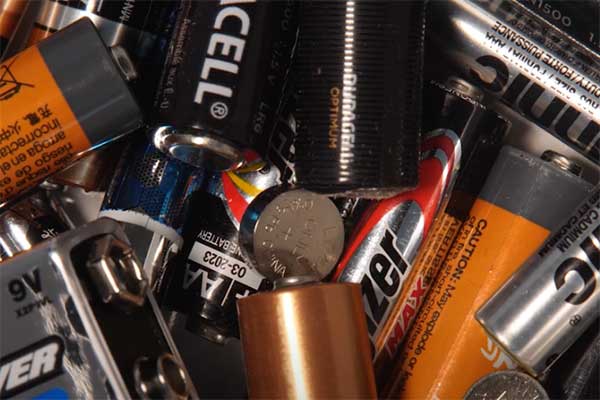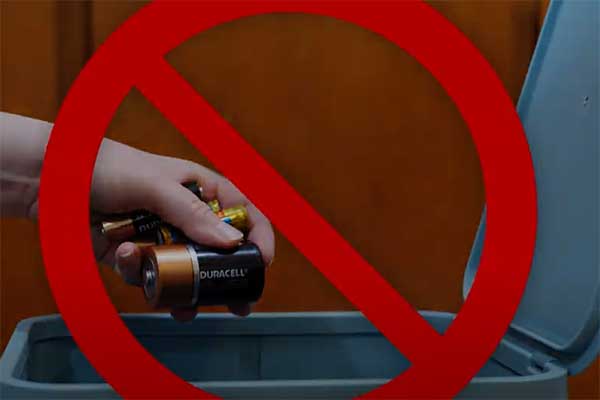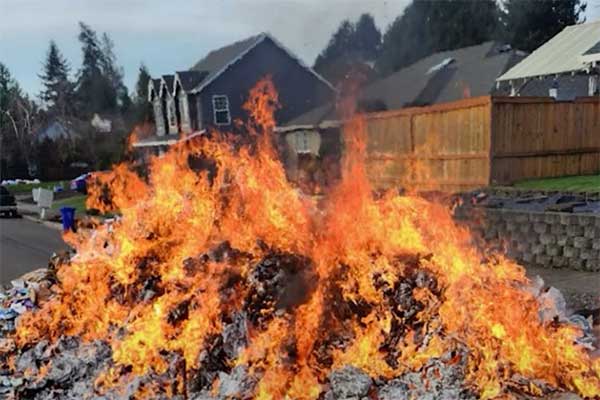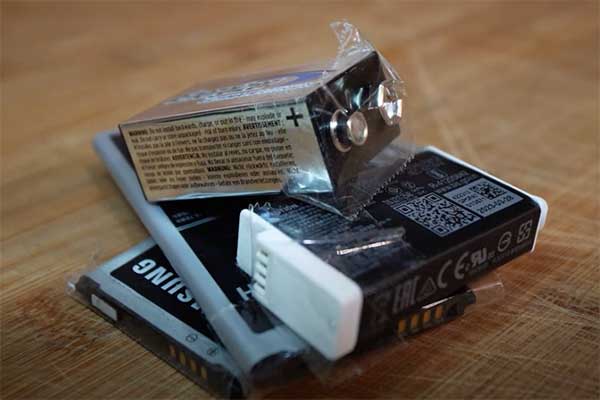Small appliances, small electronics, clean clothes and textiles. Electronics will also be collected for e-cycling.
Garbage and Recycling
Repair Fair - Lake Oswego
Small appliance, small electronics, bicycles, clean clothes, and textiles.
Free Paint Giveaway
Paint giveaway event for households and businesses in the Oak Grove area.
PaintCare is giving away leftover paint in good condition to households and businesses as a part of Oregon's statewide paint stewardship program. Attendees can browse partially-filled containers of a variety of latex- and oil-based paints, primers, and stains. Color options and quantities will vary throughout the event.
Registration is required.
Limit: 15 gallons of free paint per household.
Properly Dispose of Batteries at Home
Properly disposing of household batteries can keep our communities safe and prevent garbage/recycling truck and facility fires.
Battery Drop-Off
Household batteries can be recycled/properly disposed free of charge at Metro South’s Household Hazardous Waste Facility (2001 Washington St., Oregon City) and at other drop-off locations. Contact Metro’s Recycling Information Center at 503-234-3000 or use their Find a Recycler tool for disposal options.
While curbside battery collection is not currently available to those who live in apartment, condo, or other multifamily communities with shared garbage and recycling service, Clackamas County Sustainability & Solid Waste is working with garbage and recycling companies to find a way to offer this service in a safe manner in the future.
Have friends or family with a glass bin? Ask to use theirs and be sure to follow the instructions below.
Curbside Collection of Batteries
Curbside collection of batteries is now available to single-family residential customers throughout Clackamas County (including within all cities) as part of regular garbage and recycling collection service.
Haga click aquí para ver el video en español.
Discarded batteries can spark and cause fires when not handled properly, creating dangerous situations for garbage and recycling truck drivers, processing facilities, and our communities. Follow these three important steps below to safely recycle/dispose of batteries in your glass bin.
Batteries Accepted
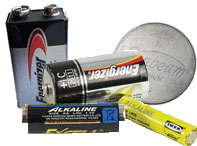
AAA, AA, C, D, button-cell & coin, 6- & 9-volt batteries

Rechargeable and single-use batteries

Batteries that can be easily removed (e.g. from old cell phones, cameras, etc.)
Batteries NOT Accepted

Batteries that do not fit in a 1 qt. zip-seal bag
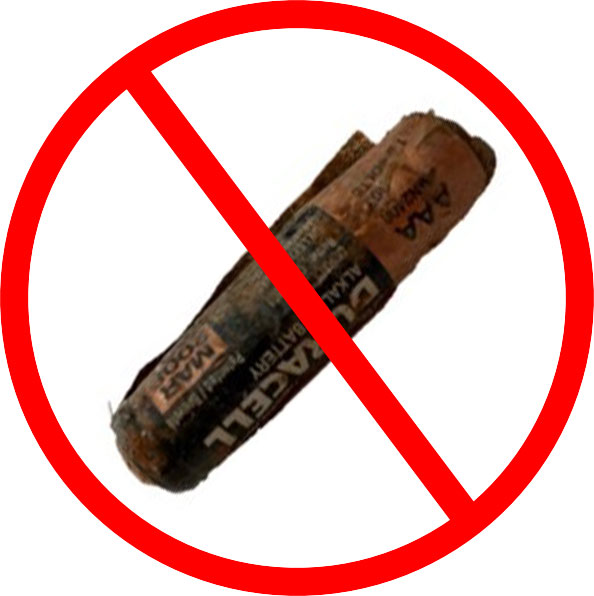
Damaged, corroded, or bulging batteries

Embedded or built-in batteries - those that are not easily removable from their products (e.g. electric toothbrush, wireless headphones, Bluetooth speakers, fitness watches/bands, vape pens, etc.)
Preparation
Follow these three steps to properly prepare your discarded batteries for recycling/disposal:

1. Tape ends of all batteries, except alkaline, with clear tape
- Can’t tell what type of battery it is? Tape it.
- For coin/button cell batteries, wrap tape around the entire battery. If you have multiple hearing aid or other coin/button cell batteries, save time by laying out a long strip of packing tape, place the batteries on the tape—be sure not to let them touch each other—and then place another long strip of tape on top.

2. Bag all batteries in a 1 qt. zip-seal clear plastic bag
- Zip-seal clear plastic bags smaller than 1 qt. are accepted.
- Bags larger than 1 qt. are not allowed.

3. Set on top of glass in the glass bin
- Set out on your regular garbage day. (Note: It is best practice to set your glass bin out only when it is at least half-full.)
- Limit of a single 1 qt. bag per pickup.
- Missing a glass bin? Contact your garbage and recycling company.
Safety Tips
Damaged (or corroded, bulging, leaking) batteries must be taken to a household hazardous waste facility. Never put damaged batteries in the trash or curbside battery recycling program.
- Place damaged batteries in a small plastic bag with absorbent, nonflammable materials, such as kitty litter, sand, or dry rice. For extra safety, place this bag into a metal can, like an old soup can.
- Take to a Household Hazardous Waste Facility for safe disposal (Call 503-234-3000 Monday-Friday, 8:30am – 5pm, for phone assistance).
Never remove embedded or built-in rechargeable batteries. If a battery doesn’t come out easily, take the whole device to a drop-off facility. Call Metro’s Recycling Information Center at 503-234-3000 on Monday-Friday, 8:30 a.m. to 5 p.m. or search Find a Recycler for recycling options.
Why it matters
Prevent fires: Batteries can spark and cause fires. Battery-caused fires in garbage trucks and waste processing facilities have increased dramatically in recent years. These fires put workers’ lives in danger and can cost millions of dollars in damage. To prevent fires, batteries must be collected separately from other waste and the batteries that are most likely to cause fires must be taped. Learn more.
Avoid harm from toxic chemicals: Many batteries contain materials that, if not disposed of properly, can be harmful to people, animals, and the environment. By collecting batteries separately, we can ensure safe handling, disposal, and recycling. [Source: EPA]
Recycle batteries into new things: Batteries contain metal, plastic, and other materials that can be used to make new products. Old batteries can be recycled into new batteries, as well as stainless steel and even road asphalt. Recycling these materials reduces the negative impacts of producing new products on our air, water, and climate. Learn more.
Frequently Asked Questions
Can the batteries be placed in an open container like a coffee can?
No. The batteries need to be in a 1-quart clear sealed plastic bag for the safety of our recycling collectors.
I have one recycling cart, not a specific glass bin. Do I put my batteries in my cart?
No. Properly prepared batteries should only be placed with your glass in your glass bin. It is important for batteries to be collected separately to reduce the risk of fire.
If you don’t have a glass bin, you can place your bag of batteries and glass in a plastic crate or bucket next to your recycling cart for pickup. Please call your collector to have a glass bin delivered to you.
Glass should not be placed in your recycling cart as it reduces the value of materials when it breaks in the recycling truck and gets mixed in with the other materials. If you don’t know your collector, check our Garbage and Recycling Companies page.
Can the rechargeable batteries from vape pens be recycled?
If the battery cartridge is replaceable, it can be included with the ends taped. Never remove embedded or built-in rechargeable batteries. Some rechargeable batteries are not designed or intended to be removed. Check the manufacturer instructions for disposal. For additional questions for rechargeable batteries, contact Metro’s Recycling Information Center at 503-234-3000 or use the Find a Recycler tool.
Can I recycle my corroding batteries?
Take your corroding, bulging or leaking batteries to a hazardous waste collection facility. Take lead acid batteries (automobile or motorcycle) to a battery shop.
My batteries weren’t picked up, what should I do now?
Make certain the batteries are in a clear sealed bag and prepared properly. Sometimes there can be issues when new initiatives begin. If your batteries aren’t being picked-up please call your collector. If you don’t know your collector, check our Garbage and Recycling Companies page.
What if I live in an apartment, condo, or mobile home community and don’t have my own glass bin?
This program is designed for single-family recycling at this time. You can take batteries to a household hazardous waste facility, battery store or home improvement store. Find details at Metro’s Recycling Information Center at 503-234-3000 or use the Find a Recycler tool to learn where you can drop off batteries and other materials for reuse and recycling.
Battery PSAs
These Public Service Announcements (PSAs) are short videos that educate the public about the importance of disposing of batteries properly and help spread awareness so we can keep our communities safe.
Ayude a mantener a todos seguros - Recicle sus pilas correctamente (video en español)
Recicle sus pilas correctamente - Ayude a mantener a todos seguros (video en español)
Reduzca los incendios - Recicle sus pilas correctamente (video en español)
Recicle pilas en casas unifamiliares con 3 sencillos pasos (video en español)
Have a question about other materials?
- Recycle Guides
View and download a Clackamas County Recycle Guide (Available in seven languages) - Find a Recycler
Look up easy options to recycle, donate or reuse anything from batteries and packing peanuts to that old dishwasher. - Metro Recycling Information Center
Call for your garbage and recycling questions at 503-234-3000. - Recycle or Not on Instagram
Check the posts and direct message pictures of questionable items to @recycleornot on Instagram. (Available in Spanish: @ReciclarONo) - Play the Recycle or Not game
Test your recycling knowledge with this interactive game. (Available in Spanish: ReciclarONo)
Solid Waste Commission Meeting - May 16, 2024 - POSTPONED
Reduce, Reuse, Recycle
Reduce, reuse, and then recycle right to reduce the energy needed to make new products, reduce pollution, and create jobs.
Oregon DEQ
The things we use (and the food we consume) affect our communities and the environment. From making a product (or growing food) to transporting it to a store (or our doorsteps) to using it (or eating it), the impacts mount at every step. How we ultimately dispose of an item, including its packaging (a peel/shell is nature’s packaging of food), also has impacts. By rethinking our relationship with stuff (and waste), we can lessen the burden on the environment by prioritizing waste reduction and reuse.
Reduce and reuse first
Buying secondhand, repairing broken items, and repurposing materials conserves natural resources, protects the environment, and saves money. By utilizing the stuff we already have (things or food), we prevent the need to make new stuff, and therefore prevent further impacts on our environment, communities, and people.
Use our interactive map to find local reuse, refill, and rental locations.
Reduce

Reducing our waste can come in many forms. We might already have something that will meet the need; other times, we may determine we don’t really need the item, such as:
- Opting not to use a straw.
- Declining a bag at check-out after purchasing only a single (few) item(s).
- Avoiding produce bags for fruits and veggies, such as oranges, onions, and avocados.
There are countless opportunities in our daily lives to avoid waste. Small actions can make a big difference. Let’s challenge ourselves to find ways, however small, to reduce our impact.
Refill
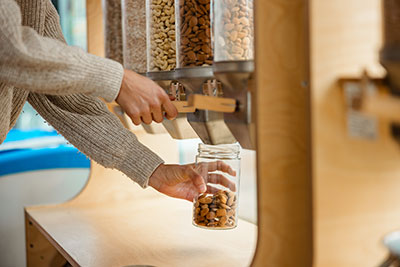
Refill to avoid new and single-use packaging—whether it be food, body care, cleaning supplies, or beverages—with containers you already own! Many local stores around the county carry items in bulk and allow you to bring your own container/bag to refill! Reuse old plastic/zip-seal, cloth, and paper bags, or bring in bottles/jars (when allowed).
Find locations on our interactive map for refilling of:
- Food
- Beverages
- Soaps, Cleaning Products/Supplies, and Body Care
Repair

Repair to keep items from going to waste unnecessarily, save money, and reduce demand for new products.
Attend a Repair Fair in Clackamas County. They are free community events were volunteer fixers help repair broken items. Learn more about upcoming Repair Fairs.
There are many repair shops, tailors, cobblers, mechanics, etc. around the region! While we work to compile a list in Clackamas County, visit Portland Repair Finder for regional options.
Visit iFixIt to learn how to fix your stuff with step-by-step videos, purchase quality parts and tools to get the job done, and read or post solutions from the fix-it community.
Rent

Share books, seeds, things with your local community. Clackamas County libraries and some businesses can help reduce the amount of things you need to own by renting books and more. From shovels to games, kitchenware, karaoke machines, gear and equipment, and more, you have access to more than you may ever need.
Libraries in Clackamas County offer books, media, and more!
Libraries of Things provide an opportunity to try out an item before you purchase your own – make sure you enjoy the ukulele before investing in your own. Instead of buying and storing an item year-round for the one or two times you use it a year, check out a bubble machine for your kid’s birthday party, and then return it for someone else to enjoy.
Seed Libraries encourage a culture of sharing and sustainability. By providing good quality, local seeds, seed libraries make growing your own food easy and accessible.
Rental shops to access music, indoor and outdoor tools, a wide variety of gear and equipment, trucks and vans, and more. Fees apply.
Find locations on our interactive map for rentals of:
- Local libraries
- Rental shops (e.g. music, tools, and equipment)
View/download PDF flyers in English & Spanish:
Reuse
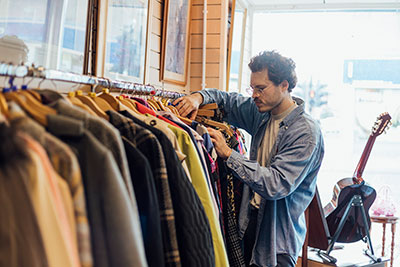
We can’t always avoid waste, but that doesn’t mean the item should go directly in the trash. Consider giving good condition items a second life.
Shop secondhand and/or for salvaged materials to save money, avoid packaging, support local businesses, and promote the circular economy.
Donate, Consign, Trade-In, and Sell clothes, furniture, and other good condition items to extend their lifespan, reduce the need for new materials, and limit usable goods going to landfill.
Find locations on our interactive map for local shopping, donation, consignment, trade-in, and selling of:
- Art & Craft Supplies
- Books
- Building Materials
- Electronics
- Outdoor/Athletic Apparel & Gear
- Thrift Stores
- And more!
Online options include (but are not limited to):
Note: The county does not endorse nor particularly support any of these independent websites/apps. Please remember to check out each site's best practice and safety tips before buying, selling, or swapping.
View/download PDF flyers in English and Spanish:
Recycle

In Oregon, we have a long, strong history and culture of recycling. By recycling right, we’re able to reduce the energy and resources needed to make new products, reduce pollution, and create jobs. In 2023, over 92,000 tons of material was collected in curbside recycling in Clackamas County.
Recycling right is of utmost importance to maintain the integrity of our recycling system. It is a surprise to many that recycling is localized. What can and cannot go in the recycle bin depends on local processing facility capabilities and limitations. So when your reusable items (water bottles, shopping bags, etc.) eventually break and become unusable, make sure you dispose of them properly (which may mean placing it in the garbage).
Learn to recycle right with the Clackamas County Recycle Guide (available in seven languages). And remember, when in doubt, throw it out! It’s better to place recyclable items in the trash than to place trash in the recycling.
Learn more and view/download recycle guides in seven languages:

Interactive Map
Find local reuse, refill, and rent locations.
More Resources
Repair Fair - Milwaukie Sustainability Fair
Small appliances, small electronics, clean clothes and textiles.
Repair Fair - West Linn
Small appliances, small electronics, clean clothes and textiles.
 Translate
Translate






